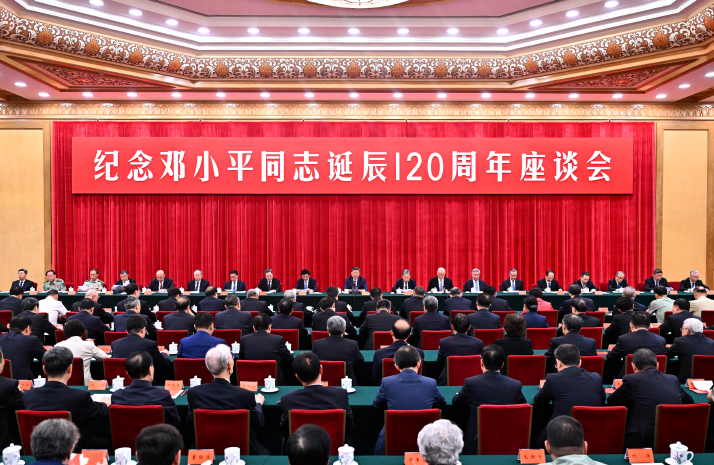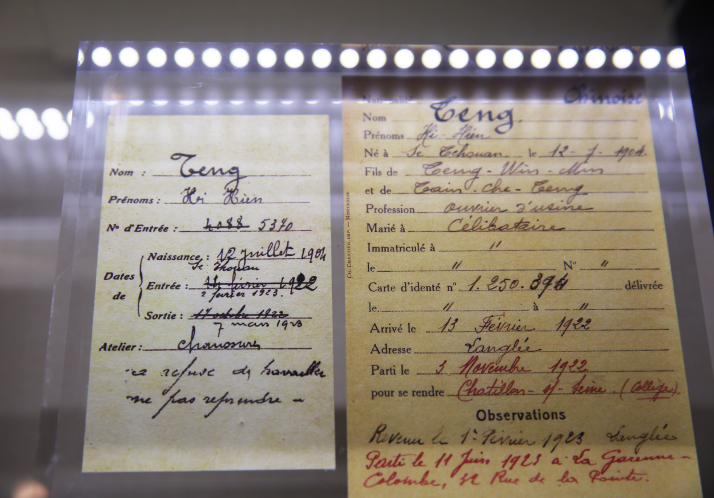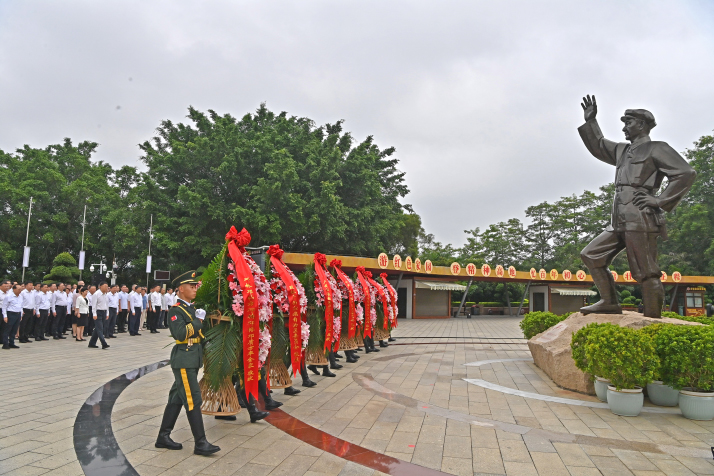| China |
| China remembers Deng Xiaoping on the 120th anniversary of his birth | |
| The world knows Deng primarily for his role in reform and opening up, but his legacy extends far beyond that | |
|
|
 The Communist Party of China Central Committee holds a symposium on August 22 at the Great Hall of the People in Beijing to commemorate the 120th anniversary of the birth of Deng Xiaoping (XINHUA)
In the spring of 1979, an elderly man drew a circle by the South China Sea… China entered a spring of renewed wonders... These are the lyrics to the song The Story of Spring, a melody familiar to every Chinese and of which most can hum a few lines. The song was released in 1994 and has become popular throughout the country since then. The "elderly man" mentioned in the lyrics is the late Chinese leader Deng Xiaoping. The name of the song was inspired by Deng's visits to south China, which usually took place in the spring. The lyrics allude to Deng's reform and opening up policies. In December 1978, the Third Plenary Session of the 11th Central Committee of the Communist Party of China (CPC) made a historic decision to shift the focus of the whole Party's work onto economic development and introduced policies aimed at economic reform and opening up, thereby ushering in a new era of development in China. The world knows Deng primarily for his role in reform and opening up, but his legacy extends far beyond that. His resilience in the face of life's ups and downs, the introduction of the household contract responsibility system, the reinstatement of the national college entrance examination, the One Country, Two Systems policy, and his recognition of science and technology as the primary productive force… All these moves demonstrate the profound wisdom of a great leader. Deng called himself "the son of the Chinese people." "I am in deep love with my country and people," he once wrote. His love for the land and the people was deeply rooted in his heart and carried through his entire life (1904-97). August 22 was the 120th anniversary of Deng's birth. Around that day, commemorative activities were held nationwide, including the issuance of commemorative stamps and the hosting of symposiums to honor his contributions. The CPC Central Committee held a symposium in Beijing on the morning of August 22 to mark the anniversary. Chinese President Xi Jinping, also General Secretary of the CPC Central Committee and Chairman of the Central Military Commission, delivered a speech. Xi noted that Deng's life was a glorious, fighting and extraordinary one. He emphasized that Deng's historical achievements are comprehensive and groundbreaking, with profound and lasting impacts on both China and the world. Xi described Deng as a great internationalist who made significant contributions to world peace and development. He said Deng made outstanding contributions to the Party, the people, the country, the nation and the world at large. Deng's achievements have been immortalized in history and will always inspire future generations. "We will forever remember his great historical achievements and forever revere his noble revolutionary conduct," Xi said. Xi also emphasized that the best way to honor Deng is to continue advancing the cause of socialism with Chinese characteristics that he initiated. "We must focus on the central task of building a great country and national rejuvenation on all fronts through a Chinese path to modernization, carrying forward the legacy and striving for progress," he said.  This photo, taken on March 22, 2021, at the Musée Historique de l'Amitié Franco-Chinoise in Montargis, shows Deng's residence registration card and work file from his time in France (XINHUA)
A trailblazer The "circle" in the lyrics to the song The Story of Spring refers to Deng's creation of special economic zones (SEZs) in four coastal cities. In April 1979, Xi Zhongxun (1913-2002), then First Secretary of the CPC Guangdong Provincial Committee, suggested to the central leadership the establishment of export processing zones, advocating for an initial step in this direction. Deng responded by favoring the establishment of SEZs, advising that the Central Government could provide some policy support but that local initiatives should take the lead, urging them to "blaze a trail." The following year, four SEZs were established in Shenzhen, Zhuhai and Shantou in Guangdong, and Xiamen in Fujian Province, pioneering the path of reform and opening up. Between January 18 and February 21, 1992, the then 88-year-old Deng conducted a southern tour, visiting Wuhan in Hubei Province, Shenzhen and Zhuhai in Guangdong, and Shanghai, and gave a series of talks, collectively known as the Southern Tour Talks. Targeting the misgivings existing among the people, Deng reviewed the experience and lessons from China's reform and opening up over the previous 14 years, offered new ideas and approaches regarding major theoretical and practical issues, and answered several questions that had confounded officials and the general public for some time. These talks represented the maturing of Deng Xiaoping Theory, and inspired the second round of China's reform and opening up. They provided timely answers to the questions of what socialism is and how socialism should be built. They effectively freed people's minds from rigid views of socialism and reaffirmed their faith in it. Reform and opening up has brought about transformative changes to China. In 1978, the scale of China's economy was only 367.9 billion yuan ($211.9 billion). By 2023, China's GDP had soared to 126 trillion yuan ($17.7 trillion). The proportion of China in the global economy increased from 1.8 percent in 1978 to more than 17 percent in 2023, second only to the United States. The average annual real growth rate between 1978 and 2023 reached around 9 percent. Justin Yifu Lin, a renowned economist and former Chief Economist and Senior Vice President of the World Bank, once remarked, "Sustaining such high growth for such a long period is unprecedented in human history." Through Time's lens Deng's influence extended far beyond China, as demonstrated by his eight solo appearances on the cover of Time magazine, one of the most influential publications in the U.S. These eight covers also stand as a testament to Deng's contributions to the world. On January 19, 1976, Deng's portrait first appeared on the cover of Time, but it was depicted in a somber and gloomy manner. Former Chinese Premier Zhou Enlai passed away on January 8 of that year. The cover of the magazine featured the phrase "China: Friend or Foe?" The relationship between China and the U.S. had begun to thaw in 1972, largely due to Zhou's pragmatic and moderate influence. Deng's direct and confrontational style caused uncertainty in the U.S. about the future of the strategic rapprochement between the two countries. On December 25, 1978, Deng appeared on the cover of Time alongside then U.S. President Jimmy Carter and then Israeli Prime Minister Menachem Begin. The headline read: "Deal with China; Deadlock with Israel." On December 18 to 22, 1978, the Third Plenary Session of the 11th CPC Central Committee was held in Beijing, making the strategic decision to shift the focus of the Party's work to economic development. By this time, the U.S. had begun to appreciate this Chinese leader.
A set of four stamps issued by China Post on August 22 to commemorate the 120th anniversary of Deng Xiaoping’s the birth (XINHUA) On January 1, 1979, Time named Deng its Man of the Year, with the headline: "Deng Xiaoping: Visions of a New China." Deng played a crucial role in normalizing Sino-American relations. January 1 was also the day the formal establishment of diplomatic relations between China and the U.S. took place. Just a month later, on February 5, 1979, Deng appeared on its cover again after he wrapped up his visit to the U.S. From January 28 to February 5, 1979, at the invitation of U.S., President Jimmy Carter, Deng made a visit to the U.S. which is often referred to as a "honeymoon" trip as it took place within a month after the two countries established diplomatic relations. On September 26, 1983, Deng once again appeared on the cover. As China's reform and opening up policies deepened and the economy grew rapidly, Deng led the Chinese people down a new path of economic development, achieving initial success. On September 23, 1985, Deng's portrait once again graced the cover of Time magazine. By then, the results of reform and opening up were already evident, and the Chinese way of life had undergone a profound transformation. The cover depicted a striking contrast between the past and the present. On one side, farmers were shown planting rice while holding up a portrait of Marx. On the other side, the image featured bustling office workers, skyscrapers, cameras, fashionable clothing, and consumer goods like hamburgers, illustrating the new lifestyle emerging in China. On January 6, 1986, Deng was once again named Time's Man of the Year in recognition of the reform and opening up policies he implemented, which had improved the lives of what was then one quarter of the world's population and contributed to global stability. The magazine noted that China's shift in economic policy, if successful, would offer an alternative to the Soviet model of communism. Time asserted that Deng's continuous reforms in China were more likely to alter the course of history than any other event in 1985. The report also included Deng's famous saying, "It doesn't matter whether the cat is black or white; as long as it catches mice, it's a good cat." On February 19, 1997, Deng passed away. On March 3, his portrait appeared on the cover of Time once again. In a gesture of respect, Time changed its usual red masthead to black for this issue.  Party members and representatives of other sectors lay wreaths at the statue of Deng in the square of the Baise Uprising Memorial Hall in Baise, Guangxi Zhuang Autonomous Region, on August 23 (XINHUA)
Carrying forward the legacy Deng was born in Guang'an, Sichuan Province and a symposium was held there on August 23 to mark the anniversary. Attendees of the symposium affirmed their commitment to carrying forward the revolutionary traditions and heritage of Deng and other veteran revolutionaries. "Deng set out on his revolutionary journey from Sichuan and always held a deep affection for his home," Wang Xiaohui, Secretary of the Sichuan Provincial Committee of the CPC, said at the symposium. On August 26, the Guangdong Provincial Government held a symposium to mark the anniversary in Shenzhen, one of the four original SEZs established by Deng. Attendees of the symposium emphasized that Deng visited Guangdong numerous times throughout his life, dedicating significant effort and placing great hopes on the province's development during varying historical periods. He supported the establishment of the original three SEZs in Guangdong and guided Guangdong's reform, opening up and modernization efforts. The attendees expressed their commitment to carrying forward the spirit of Deng and other members of the older generation of revolutionaries as they strive to forge ahead on a new journey and contribute to the achievements of the new era. A symposium was also held on the same day in Shanghai. As the chief architect of China's reform, opening up and modernization, Deng charted the course and set the direction for Shanghai's reform and opening up. The attending representatives reflected on Deng's illustrious, courageous and extraordinary life. They pledged to carry forward the spirit of Deng and other members of the older generation of revolutionaries, ensuring that the original aspirations are passed down through generations and that the mission remains firmly shouldered. BR (Print Edition: Echoes of Spring) Copyedited by G.P. Wilson Comments to zhangshsh@cicgamericas.com |
|
||||||||||||||||||||||||||||
|
